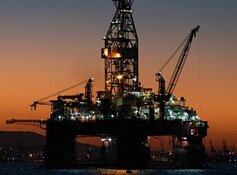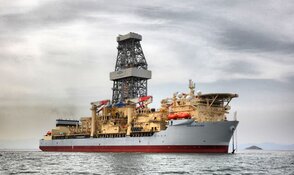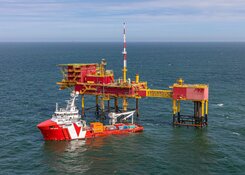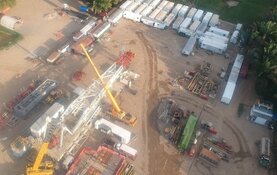The Energy Report: Please give us your overview of the oil and gas markets.
Steve Palmer: Right now, there is a supply/demand imbalance: Too much supply for both gas and oil. The imbalance has created downward pressure on the price of both commodities. Investor sentiment is quite negative in the space, which is shortsighted.
TER: Does the low price of energy have a positive effect in terms of industry being able to make products cheaper?
SP: There are industries that benefit from cheaper energy—airlines, transportation, some manufacturing. But in Canada, energy production and export are a big part of our economy, so the downside of the price decline overwhelms the benefits of lower energy prices.
"Blackbird Energy Inc. has just finished drilling two high-impact wells; its odds of success are quite high."
TER: Will oil and gas prices gravitate to equilibriums?
SP: Yes—oil and gas prices are in the process of finding equilibrium. Prices go into freefall when the market overreacts, and then they bounce up. Oil went from $95/barrel ($95/bbl) to $45/bbl. It is not going to bounce back to $90/bbl in the near term, but it seems to have found a bottom and should settle in a new range, likely higher than current levels, within the next few months.
TER: At what equilibrium price can a junior exploration and production company remain profitable?
SP: Each company has its own economics. It is very hard to predict exactly where the oil price will settle. Nobody predicted that it was going to collapse to $45/bbl! My guess is that oil will trade up to the low $60s, and sit there for a bit.
TER: What do these price fluctuations mean for the Canadian small-cap energy market, in which you specialize?
SP: It is not a very pretty sight. A lot of junior firms have been crushed by falling prices. All of the analysts have revised their oil numbers into the $50s. Companies are cutting capital expenditures (capex).
TER: How has your firm, AlphaNorth Asset Management, fared?
SP: We have taken some lumps here and there but, by and large, we've done OK considering how badly the sector has performed. I focus on names that have company-specific catalysts, and names that are not as dependent on the commodity price.
TER: Who do you like in natural gas?
SP: Painted Pony Petroleum Ltd. (PPY.A:TSX.V) is heavily weighted toward natural gas—90%. It's a mid-cap name with good management and a very strong growth profile. Its valuation may come down a little bit, but in this environment, many companies are just hoping to maintain production in 2015 with lower capex.
TER: Does Painted Pony have the cash to survive the downturn?
SP: The company has a very strong balance sheet, loaded with unused credit facilities. Painted Pony raised a good deal of money in the public market at $12/share just prior to the meltdown, which was fortunate timing. The real upside is that Painted Pony is operating in the Montney, which is one of the most economic plays in North America. The company is in the top economic decile for Montney players.
"Investor sentiment is quite negative in the space, which is shortsighted."
TER: What makes the Montney a good play?
SP: The cost to drill a well versus the return. Liquids are the key component. Many Montney drillers get a mix of different liquids, which provides a premium to West Texas Intermediate (WTI).
TER: Are the drilling costs cheaper in the Montney?
SP: Drilling costs are coming down everywhere, because demand has dropped substantially for drilling rigs. Guys are canceling rigs.
TER: Are purveyors of drilling rigs holding the line?
SP: Drillers tend to make money in any pricing environment. Their costs are largely variable: They can just lay off people and park the rigs.
TER: Who else do you like in the Montney?
SP: Blackbird Energy Inc. (BBI:TSX.V) has a strong management team. The company has a lot of cash and has just finished drilling two high-impact wells testing the Upper Montney and Middle Montney. The results will be released soon. Blackbird's odds of success are quite high in my view. After drilling these wells, it will have a strong cash position with no debt. If the wells are successful, Blackbird will have proven up a significant portion of its land. The analysts will extrapolate success across the rest of its land base and lower their discount rate assumptions.
TER: Blackbird's share price has doubled during the last two quarters. Why?
SP: Blackbird's share price has responded to the firm's strong financial position and the significant upside to its land base if the newly drilled wells are successful. In a terrible market, Blackbird is trading within a couple pennies of its all-time high, which is a big deal given that most of the energy names are down 50% or more. Blackbird's stock could perform strongly once the well results are out.
"Oil prices seem to have found a bottom and should settle in a new range, likely higher than current levels, within the next few months."
TER: Have you been following Blackbird for a while?
SP: Yes, we have been a long-term supporter of Blackbird. I know the CEO quite well. My firm has participated in all of Blackbird's financings. One of the financings was below $0.10/share, so Blackbird has been a significant win for us, so far. Blackbird is about $0.35/share today.
TER: Are there any other Canadian small caps that you like?
SP: The western Canadian market is a fairly mature basin. Most of my current focus is on developing high-impact international situations.
TER: Who do you like for basics on the international scene?
SP: We are invested in Primeline Energy Holdings Inc. (PEH:TSX.V), which is a very good risk/reward opportunity. Its main project is a bit behind schedule, but management has executed on what it said it was going to do, which was to build a natural gas pipeline from the East China Sea to the mainland. The company started production in Q4/14. This year, that project will generate approximately US$50 million (US$50M) cash flow. It is important to note that the depressed natural gas prices in Canada are locked into the supply/demand reality of North America. The supply/demand situation for oil and gas is very different in China. Primeline has a price of about $14/thousand cubic feet guaranteed in long-term contracts.
TER: What is the energy resource potential in the area that Primeline is exploring?
SP: The East China Sea is a very significant gas resource. Primeline has identified excellent locations for exploratory wells. Its drilling partner is a Chinese national oil company, China National Offshore Oil Corp. (CNOOC [883:HKSE; CEO:NYSE]).
TER: How do you assess the quality of Primeline's management?
SP: Primeline is run by experienced energy guys who have delivered on what they said. I have met them many times over the years, and we are moving forward together.
TER: How is Primeline financing its East China Sea project?
SP: CNOOC funded the entire development of the pipeline and production platform. A syndicate of Chinese banks has now financed Primeline's portion of these costs, resulting in about $200M debt to Primeline at a reasonable interest rate. At first glance, that appears like an awful lot of debt for a small company, but Primeline does have significant cash flow, and it is not subject to fluctuations in the commodity price. The whole situation of supply/demand and financing opportunity is not comparable to what is going on in western Canada.
TER: How is the market treating Primeline's share price?
SP: Primeline's stock is above what I paid for it several years ago. That is a big win, given the shape of the junior market during that period.
TER: Are there any Canadian-based juniors making waves in South America?
"Drilling costs are coming down everywhere, because demand has dropped substantially for drilling rigs."
SP: We have held shares in Sintana Energy Inc. (SNN:TSX.V) for a long time. We like Sintana because, at the end of the day, we see a very good return potential relative to the risk. Sintana has partnered with Exxon Mobil Corp. (XOM:NYSE), which is a very strong partner. Exxon only gets involved in sizable projects. It is paying the entire cost of the first two wells for Sintana in Colombia. These wells will take a couple of months to drill.
TER: What's the geological layout of the Sintana's holdings in Colombia?
SP: Sintana's property is located in the Magdalena Valley in Colombia. Many major energy companies have had success in that region. Sintana has three-dimensional seismic over its property. Management believes that the odds are high—50% plus—that the wells it is drilling with Exxon will be successful in finding an economic hydrocarbon resource.
There are two opportunities for success here. It is not just a one-shot situation. Exxon is only farming into the unconventional portion, which is the lower zone of the well. There is also a conventional zone midway down in the structure, to which Sintana retains 100% control. If that project is successful, the net amount to Sintana could be 200 million barrels of unconventional resource. Let's throw around a valuation number—say $5/bbl in the ground. That amounts to $1 billion of value. This is a ballpark figure, but the numbers are so big in this region that it really does not matter what the exact multiplier is, given that Sintana's market cap is only $15M.
TER: How is the political situation in Colombia for foreign investors?
SP: Colombia is not the ideal place in the world to be operating, but it has been good for Sintana and Exxon. Many major international energy players have been successful and are active in Colombia.
TER: Do you have a guiding investment strategy?
SP: In the energy space, short-term investors are negative on both gas and oil. Analysts are aggressively lowering forecasts. Generally, when that happens, it is a good time to be contrarian. As a long-term investor, I actively search the space for opportunities.
TER: Has being a contrarian paid off for your investment firm, AlphaNorth?
SP: Our total return since we launched our flagship fund seven years ago has been approximately 50%. In the context of the TSX Venture index, which has returned -75% over the same period, we have done very well.
TER: Nice talking to you, Steve.
 Steve Palmer is a founding partner, president and chief investment officer of AlphaNorth Asset Management and currently manages the award winning AlphaNorth Partners Fund, AlphaNorth Growth Fund and AlphaNorth Resource Fund. Prior to founding AlphaNorth in 2007, Palmer was employed as vice president at one of the world's largest financial institutions, where he managed equity assets of approximately CA$350M. Palmer managed a pooled fund, which focused on Canadian small-capitalization companies, from its inception to August 2007, achieving returns of 35.8% annualized over a nine-year period, which ranked it No. 1 in performance by a major fund ranking service in its small-cap, pooled-fund category. Palmer earned a bachelor's degree in economics from the University of Western Ontario and is a Chartered Financial Analyst.
Steve Palmer is a founding partner, president and chief investment officer of AlphaNorth Asset Management and currently manages the award winning AlphaNorth Partners Fund, AlphaNorth Growth Fund and AlphaNorth Resource Fund. Prior to founding AlphaNorth in 2007, Palmer was employed as vice president at one of the world's largest financial institutions, where he managed equity assets of approximately CA$350M. Palmer managed a pooled fund, which focused on Canadian small-capitalization companies, from its inception to August 2007, achieving returns of 35.8% annualized over a nine-year period, which ranked it No. 1 in performance by a major fund ranking service in its small-cap, pooled-fund category. Palmer earned a bachelor's degree in economics from the University of Western Ontario and is a Chartered Financial Analyst.
Read what other experts are saying about:
Want to read more Energy Report interviews like this? Sign up for our free e-newsletter, and you'll learn when new articles have been published. To see a list of recent interviews with industry analysts and commentators, visit our Interviews page.
DISCLOSURE:
1) Peter Byrne conducted this interview for Streetwise Reports LLC, publisher of The Gold Report, The Energy Report, The Life Sciences Report and The Mining Report, and provides services to Streetwise Reports as an independent contractor. He or his family own shares of the following companies mentioned in this interview: None.
2) The following companies mentioned in the interview are sponsors of Streetwise Reports: Blackbird Energy Inc. The companies mentioned in this interview were not involved in any aspect of the interview preparation or post-interview editing so the expert could speak independently about the sector. Streetwise Reports does not accept stock in exchange for its services.
3) Steve Palmer: I own, or my family owns, shares of the following companies mentioned in this interview: None. I personally am, or my family is, paid by the following companies mentioned in this interview: None. Funds managed by AlphaNorth own shares in Painted Pony Petroleum, Blackbird Energy, Primeline Energy Holdings and Sintana Energy. I was not paid by Streetwise Reports for participating in this interview. Comments and opinions expressed are my own comments and opinions. I determined and had final say over which companies would be included in the interview based on my research, understanding of the sector and interview theme. I had the opportunity to review the interview for accuracy as of the date of the interview and am responsible for the content of the interview.
4) Interviews are edited for clarity. Streetwise Reports does not make editorial comments or change experts' statements without their consent.
5) The interview does not constitute investment advice. Each reader is encouraged to consult with his or her individual financial professional and any action a reader takes as a result of information presented here is his or her own responsibility. By opening this page, each reader accepts and agrees to Streetwise Reports' terms of use and full legal disclaimer.
6) From time to time, Streetwise Reports LLC and its directors, officers, employees or members of their families, as well as persons interviewed for articles and interviews on the site, may have a long or short position in securities mentioned. Directors, officers, employees or members of their families are prohibited from making purchases and/or sales of those securities in the open market or otherwise during the up-to-four-week interval from the time of the interview until after it publishes.










































